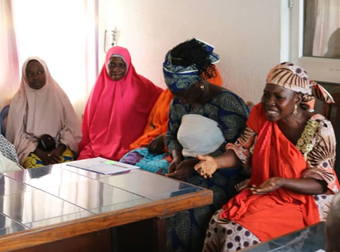Speeches Shim

Working at the Niger State Water Board has taken on a whole new meaning for Aishatu Mohammed, Sadiya Suleiman, Salamatu Ibrahim and Zainab Yunusa. For this foursome, it is no longer business as usual, but a higher call to duty and excellence. They have each been appointed to one of four out of the Board’s five newly appointed unit heads.
As a participating state in the USAID-supported Effective Water and Sanitation (E-WASH) activity, Niger state recently conducted baseline assessments that showed the Board had staffing level of 571 men and 92 women, a ratio of nine males to every female staff member. Of the 12-member management team, only two were women.
E-WASH, which provides technical support to improve administration and service delivery, has brought forth a host of gender-enabling activities to the Board, including gender awareness trainings and establishment of new sanitation, monitoring and evaluation, customer care, gender, and pro-poor and non-revenue water. The stars of our story now head four-fifths of these units.
In the context of the gender, religious and even the hitherto prevailing organizational culture of the conservative state, the appointments were remarkable. Not only were they helping the Board realize its potential, but they were a clear sign it is on track to mainstream gender in its operations.
“Previously, women were by and large not recognized,” Ms. Yunusa, who now heads the Customer Care Unit Head and doubles as the CSO liaison officer said. “Now they are beginning to see our capacity and strengthening our skills.”
Ms. Suleiman, who oversees the Gender and Pro-poor Unit adds that “women had never been in the limelight. There were some females in leadership positions, but their presence was more nominal and strategic.”
E-WASH specialists mentored the new unit heads to ensure they clearly understand their roles and what was expected of them. Within just a few months of their appointment, the results are clear.
“My monitoring and evaluation skills limited at the start,” Ms. Mohammed of the M&E Unit explained, “but within just four months of my appointment, I have developed eight different templates used by our departments to collect data, which will ultimately lead to improved revenue generation. I am excited to see that the work I do helps the utility plan for the future.”
To ensure that more women come to work and stay at work, Ms. Suleiman is blazing the trail in her Unit. Women have particular expectations with regard to sanitation, she said, citing a clean office toilet as an obvious example that she took to the Board management, which duly authorized repairs of one of the headquarters’ commodes. Additional renovations of the office are providing a more hospitable workspace for staff.
The Customer Care Unit has also recorded big wins in only four months of existence, having successfully resolved 108 of the 110 customer complaints about billing, burst pipes, and disconnections, out of which 108 have been successfully attended to.
All firm believers in the corporatization of the Board, these women are well aware that change is not easy, and often slow coming, but remain enthusiastic that things are looking up.
“I am optimistic,” Ms. Suleiman said. “Being a unit head is a privilege that has opened doors for me to do more. I believe my being here is paving the way for other women to come in.”

Comment
Make a general inquiry or suggest an improvement.